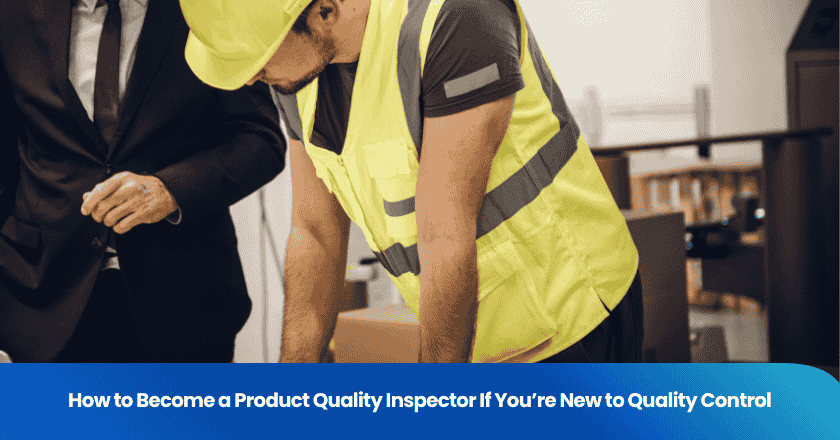
You can start your career as a product quality inspector even if you have no experience. Companies around the world need people who care about quality. The demand for this role stays strong in many regions:
| Region | Demand Factors |
|---|---|
| North America | Strong industrial base, rapid adoption of automation and AI, stringent manufacturing regulations. |
| Europe | High product standards, commitment to sustainable manufacturing practices. |
| Asia Pacific | Fastest growth due to booming manufacturing industries, focus on automation for high-quality products. |
With the right steps, you can enter this field and build a stable future.
Key Takeaways
- You can start as a product quality inspector with just a high school diploma. Many employers offer on-the-job training to help you learn the necessary skills.
- Focus on developing both technical and soft skills. Attention to detail, problem-solving, and communication are crucial for success in quality control.
- Gain practical experience through internships or entry-level jobs. These opportunities help you understand daily responsibilities and build your resume.
- Consider earning certifications like CAST or ISTQB to enhance your qualifications. Certifications demonstrate your commitment to quality control and can improve job prospects.
- Stay updated on industry trends and technologies. Continuous learning helps you adapt and grow in your career as a quality assurance inspector.
What Is a Product Quality Inspector?
Main Duties
As a product quality inspector, you play a vital role in maintaining high standards throughout the production process. You focus on identifying defects, ensuring compliance, and supporting continuous improvement. The table below outlines the primary responsibilities you will encounter in this position:
| Responsibility | Description |
|---|---|
| Sampling | Select random samples from production batches to evaluate overall quality. |
| Defect Identification | Spot flaws and discrepancies, deciding if they require correction. |
| Quality Standards Adherence | Ensure products meet industry regulations, customer requirements, and safety guidelines. |
| Testing Equipment Operation | Use tools like calipers and gauges for precise assessments. |
| Collaboration | Work with production teams to communicate issues and recommend solutions. |
| Root Cause Analysis | Investigate causes of quality issues to prevent recurrence. |
| Process Improvement | Provide feedback to improve production processes. |
| Final Inspection | Perform last checks before distribution to confirm standards are met. |
| Reporting | Generate reports on inspection results and corrective actions. |
| Training | Teach new employees about quality control procedures. |
| Continuous Monitoring | Monitor production processes to maintain quality standards. |
| Safety Regulations | Ensure compliance with occupational health and safety guidelines. |
Work Environments
You may work in a variety of settings as a quality control inspector. Many inspectors spend time on factory floors, in warehouses, or at shipping docks, where they examine products alongside production teams. These environments often require quick decision-making and attention to detail. Some inspectors work in laboratories, where you test products under controlled conditions to simulate specific scenarios. Each setting demands a unique approach, but your goal remains the same: maintain product quality and safety.
Why This Role Matters
Your work as a quality control inspector directly impacts product safety and customer satisfaction.
You ensure mass-produced goods meet strict quality requirements.
You prevent defective products from reaching customers.
You help reduce the risk of recalls and protect the reputation of the company.
A product quality inspector helps companies deliver reliable products and build trust with customers. Your attention to detail and commitment to standards make a difference every day.
Education and Entry Requirements
To start your journey as a product quality inspector, you need to meet some basic educational standards. Most employers look for candidates who have completed high school or earned an equivalent credential. Some positions may require additional education or certifications, but you can often begin with entry-level qualifications.
High School Diploma or Equivalent
You must have a high school diploma or a General Educational Development (GED) certificate. This requirement shows employers that you have the foundational skills needed for the job. Math, science, and communication classes help you develop the analytical and problem-solving abilities that quality control work demands.
Vocational and Training Programs
You can boost your qualifications by enrolling in vocational programs or specialized training. Many community colleges and technical schools offer courses in manufacturing, industrial technology, or quality management. These programs teach you how to use inspection tools, read technical drawings, and understand industry standards. Some programs also provide hands-on experience, which helps you stand out when you apply for jobs.
Tip: Look for training programs that include practical exercises or internships. These experiences give you a real-world understanding of inspection processes.
On-the-Job Training
Many employers offer on-the-job training for new inspectors. You will learn how to use inspection equipment, follow safety procedures, and document your findings. Supervisors and experienced inspectors guide you through daily tasks. This training helps you build confidence and develop the skills you need to succeed in quality control. You can expect to receive feedback and support as you grow in your role.
Essential Skills for Quality Control Inspectors
Technical Skills
As a quality assurance inspector, you need a strong foundation in technical skills. Employers value your ability to ensure products meet standards and regulations. You must understand inspection tools and methods. You also need to document findings and analyze data. Here are the most important technical skills for a quality assurance inspector:
- Quality Assurance: You check products and processes to maintain high standards.
- Regulatory Compliance: You follow laws and guidelines that apply to your industry.
- Inspection Report Writing: You record results clearly for others to review.
- Risk Assessment: You identify hazards and evaluate their impact.
- Data Analysis: You interpret statistics to spot trends and improve processes.
- Maintenance and Repair Knowledge: You understand mechanical and electrical systems.
- Safety Inspections: You confirm that workplace safety rules are followed.
- Quality Control: You help keep product quality consistent.
- Problem-Solving: You find and fix issues quickly.
- Documentation Management: You organize inspection records for future use.
Soft Skills
A quality assurance inspector also relies on soft skills to succeed. You must communicate findings and work with teams. You need to adapt to changing situations and manage your time well. The following soft skills help you excel as a quality assurance inspector:
- Attention to Detail
- Problem-Solving
- Communication
- Team Collaboration
- Adaptability
- Time Management
- Critical Thinking
- Leadership
- Conflict Resolution
Tip: Strong communication and teamwork help you share inspection results and solve problems with others.
Ways to Build Skills
You can develop your skills as a quality assurance inspector through practical experience and learning. Start by practicing inspection techniques in real-world scenarios. Take knowledge-based tests to check your understanding of inspection methods. Seek feedback from supervisors and peers. You can also join workshops or online courses to improve your technical and soft skills.
You build confidence and expertise by combining hands-on practice with continuous learning.
How to Become a Quality Control Inspector: Step-by-Step
Starting your journey as a quality assurance inspector requires a clear plan. You can break the process into manageable steps. Each step builds your knowledge, skills, and confidence. Here is a practical guide on how to become a quality control inspector, even if you are new to the field.
Learn About the Industry
You need to understand the basics of quality control before you step into the role. The industry values professionals who know what makes a product acceptable and how to maintain high standards. Begin by exploring the core principles:
1. Establish quality standards: Learn what makes a product meet customer and regulatory requirements.
2. Conduct inspections: Study how to check products at different stages of production to catch defects early.
3. Execute corrective and preventive actions: Discover how to address defects and prevent them from happening again.
4. Monitor and improve: Review quality control processes regularly to find ways to enhance them.
Tip: Stay updated on industry trends. Big Data Analytics, IoT, and AI are transforming how quality assurance inspectors work. These technologies help you analyze data, monitor products in real time, and access documentation quickly.
You can use several resources to deepen your understanding:
- Transferable skills such as attention to detail, problem-solving, and communication help you identify defects.
- Personal skills like patience, adaptability, and persistence support you in high-pressure environments.
- Content skills include knowledge of quality standards, safety protocols, and inspection tools.
- Networking with experienced professionals on platforms like LinkedIn or through organizations such as ASQ gives you valuable insights.
- Hands-on experience, such as shadowing a product quality inspector or visiting manufacturing sites, provides practical exposure.
Meet Basic Requirements
Most employers expect you to meet certain entry-level criteria before you apply for a quality control inspector position. These requirements help you build a strong foundation for your career.
- A high school diploma or equivalent is usually necessary.
- Some roles may require additional education in manufacturing or engineering.
- Hands-on experience with inspection tools and processes is important.
- Earning certifications, such as Six Sigma or those from professional organizations, can improve your job prospects.
Note: Many employers offer on-the-job training. This training helps you learn how to use specific equipment and follow industry standards.
Gain Experience
You can build your experience in several ways before applying for a full-time quality assurance inspector role. Practical exposure helps you understand the daily responsibilities and prepares you for more advanced positions.
- Internships and Apprenticeships: These programs combine classroom learning with real-world practice in quality control. You work alongside experienced inspectors and learn inspection techniques.
- Entry-Level Jobs: Positions such as production assistant or factory worker introduce you to manufacturing processes and quality standards. You gain familiarity with inspection routines and documentation.
- On-the-Job Training: Many employers provide training to help you master equipment and industry protocols.
Common entry-level job titles include:
- Quality Assurance Inspector
- Quality Control Technician
- Junior QA/QC Analyst
- QA/QC Intern
- Quality Control Associate
Tip: Look for apprenticeships or internships that offer hands-on experience. These opportunities allow you to learn directly from professionals and build your resume.
Apply for Jobs
Once you have the right skills and experience, you can start applying for quality control inspector positions. Prepare a resume that highlights your education, training, and any hands-on experience. Emphasize your attention to detail, problem-solving abilities, and communication skills.
Consider boosting your qualifications with online courses or certifications.
Here are some recommended options:
| Course Title | Description | Cost |
|---|---|---|
| Quality Inspector's training | Covers fundamentals, measurement techniques, ISO compliance, defect identification, and root cause analysis. | N/A |
| 10 Inspection Courses | Offers practical skills for various inspection roles, including workplace and hotel housekeeping inspections. | Free (up to 10 users), $49 for some |
| QualCert Level 1 Certificate in QA | Designed for those starting or advancing in quality management. | N/A |
| Certified Field Auditor | Reviews industry quality and safety standards, includes a certification exam. | N/A |
Tip: Tailor your application to each job. Highlight your training, certifications, and any relevant experience. Use keywords from the job description to show you are a strong fit.
You can also keep learning as you grow in your career. Stay informed about new technologies and industry trends. Advancements in testing technologies, stricter safety regulations, and increasing consumer expectations continue to shape the role of the product quality inspector.
Certifications and Growth as a Quality Assurance Inspector
Entry-Level Certifications
You can boost your career as a quality assurance inspector by earning entry-level certification. These credentials show employers that you understand the basics of quality control and inspection. Many organizations recognize certifications such as CAST and ISTQB. These programs teach you how to apply quality standards and inspection methods in real-world situations.
Certification helps you stand out when you apply for quality control inspector positions. You gain confidence in your inspection skills and show your commitment to professional growth.
Career Advancement
As a quality assurance inspector, you open doors to many career paths by gaining experience and earning certification. You can move into roles with more responsibility and higher pay.
The table below outlines typical career paths and requirements:
| Career Path | Responsibilities | Requirements |
|---|---|---|
| Quality Technician | Inspect and test products, write up nonconforming materials, train inspectors | High school diploma and 2-4 years of experience or an associate's degree in a related field. |
| Quality Engineer | Handle statistical analysis, root cause investigations, process improvement | Typically requires a bachelor’s degree in engineering; some positions may accept relevant experience. |
| Quality Auditor | Audit companies to ensure compliance with standards like ISO 9001 | Bachelor's degree relevant to the industry and 2-10 years of experience in QA. |
| Quality Manager | Direct quality professionals, manage budgets, ensure compliance with QMS | 5-10 years of experience in a Quality department and supervisory experience. |
Certification increases your eligibility for roles such as manager, auditor, or consultant. You also enjoy better job security and higher salaries. For example, entry-level quality control inspector salaries average $31,950 per year, while experienced professionals can earn up to $72,210.
Lifelong Learning
You must keep learning to stay current as a quality assurance inspector. The field changes quickly, and ongoing training helps you adapt. You can take free online courses that cover best practices and management system audits. These resources help you identify and solve new challenges.
- Free online quality assurance courses with certificates
- Training in management system audits
1. Enroll in new courses and certifications regularly.
2. Gain practical experience through internships or entry-level positions.
3. Network with other professionals in groups or forums.
4. Set and review personal performance goals.
5. Seek mentorship from experienced quality control inspector professionals.
Lifelong learning keeps your skills sharp and prepares you for future opportunities in quality assurance and quality control inspection.
To start your journey as a product quality inspector, follow these steps:
1. Finish high school or earn a GED.
2. Learn on the job through entry-level roles.
3. Take short-term courses in quality systems or manufacturing.
4. Gain experience and move into advanced positions.
You may face challenges like inconsistent inspection processes or communication gaps, but regular training and teamwork help you overcome them.
Many find motivation in achievement, praise, and career advancement:
| Motivation Type | Description |
|---|---|
| Sense of Achievement | Completing tasks and reaching goals |
| Praise | Recognition from peers and supervisors |
| Career Advancement | Opportunities for promotion and growth |
| Company Mission | Aligning with company values |
| Social Impact | Making a difference in society |
You can build a rewarding career and make a real impact in this field.
FAQ
What does a typical day look like for a product quality inspector?
You start by reviewing production schedules. You inspect products, record findings, and report issues. You may attend team meetings and help solve quality problems. You finish by updating inspection logs and preparing reports.
Do you need previous experience to become a quality control inspector?
You do not need previous experience for many entry-level roles. Employers often provide on-the-job training. You can build skills through internships, apprenticeships, or entry-level positions in manufacturing.
What industries hire product quality inspectors?
You find opportunities in manufacturing, automotive, electronics, food processing, pharmaceuticals, and textiles. Many industries need inspectors to ensure products meet safety and quality standards.
How can you improve your chances of getting hired?
You can complete short courses in quality control. You should practice using inspection tools. You can join workshops or seek internships. Highlight your attention to detail and problem-solving skills on your resume.
Is certification required to work as a quality inspector?
Certification is not always required for entry-level jobs. Earning a certification can help you stand out. It shows your commitment to learning and professional growth.
Grow your business with TradeAider Service
Click the button below to directly enter the TradeAider Service System. The simple steps from booking and payment to receiving reports are easy to operate.





